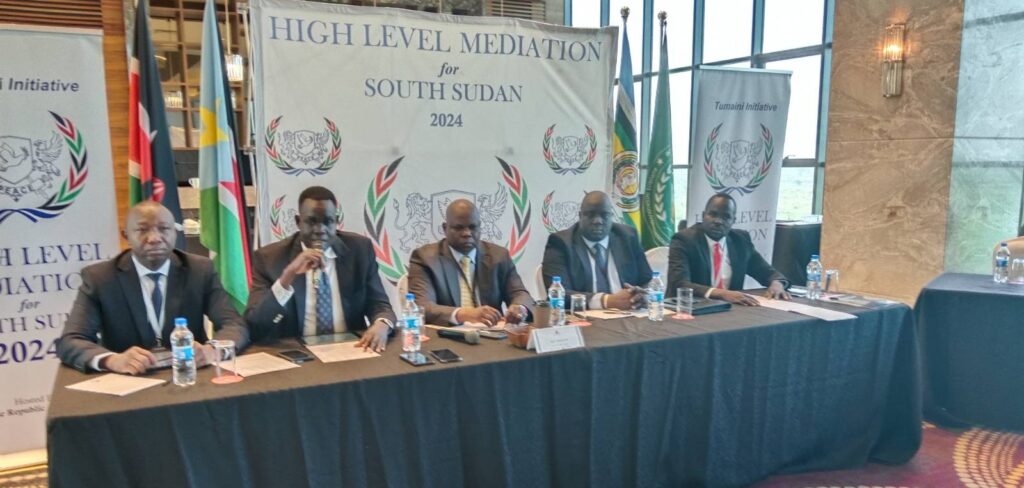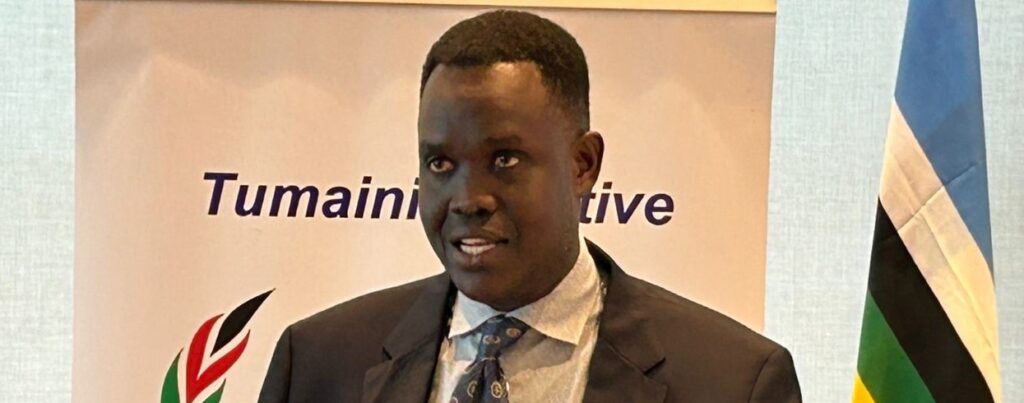Lual Dau, a former deputy governor and now key participant in the Nairobi peace talks, said the talks might extend the transitional government’s tenure, but it should be a national and inclusive program.
In part 1 of an exclusive interview with Radio Tamazuj, Dau, a former deputy governor of the defunct Lol Sate and a leading member of the South Sudan United Front (SSUF), which is part of the South Sudan Opposition Movements Alliance (SSOMA) faction, shed light on the ongoing negotiations and convergence points.
He also emphasized the importance of reforming the National Security Service, adopting a new constitution, and creating a just system.
Below are edited excerpts:
Q. What is going on inside the negotiation room in Nairobi?
A. Thank you so much. This is an important question as South Sudanese have the right to know what is going on in Nairobi. We are now at a very critical time in our history. We are in Nairobi and yet the majority of our people lack the necessities. Access to water and food has become difficult for everybody. A number of our children are getting sick and their mothers are unable to access health services. We do not have roads and the economic situation is hard, even civil servants have not received their salaries for many months. Our country is facing serious economic challenges, yet there is insecurity all over, and yet there is no consensus among us.
The reason for the current situation is our mistakes, especially the political and military elites. When South Sudan became independent in 2011, the people were optimistic. Unfortunately, we, the political elite, failed to achieve the security, peace, development and services to the citizens. Furthermore, we have killed ourselves. The Nairobi talks are the last chance to seek peace for our country. The opposition parties, SSOMA, the civil society, the religious leaders and all the stakeholders, want to focus on the root causes of the conflict and expect that the ongoing Nairobi is the last chance to achieve peace.
Q. What are you looking forward to as SSOMA?
A. One of the most important things we want in Nairobi is a new constitution. Because without an appropriate constitution, you cannot establish strong institutions. We are keen to reach an agreement with the government to give a chance to the South Sudanese to be an important partner in making the constitution. Through such a constitution, the people will sign a social contract with the politicians that they need roads, education, hospitals, security and so on.
Q. Are you ready to implement these demands?
A. Through a new constitution, we will have a chance to establish strong institutions. For any government to serve well, there should be an executive body capable of delivering services. Legislators should be independent to enact laws. The Judiciary should also be independent to implement the law. The constitution will also help in conducting elections, which will lead to a democratic transition. If South Sudanese reach the stage of writing their own constitution, it will lead to the examining of the other serious issues, which need urgent solutions. For example; the firearms in the hands of civilians. There is no way a country can develop when there are firearms in the hands of everybody. Proper security arrangements should lead to the formation of a national army. There should be a police force that is able to protect the civilians. All other organized forces should be established to protect the citizens. The other issue is the economic security. Since 2013, some of our citizens have been living in POC. Children who were five years old when the family moved to POC, are now 18. Those who were born there are now between 12 to 13 years old. This is regretful and needs an immediate intervention. This would also include other refugees who fled to countries such as Kenya, Sudan and Ethiopia.

Q. Some South Sudanese are pessimistic about the talks and they think the government is trying to extend its stay in power. What is your opinions?
A. In accordance with the 2018 Peace Agreement, the government’s tenure was extended and as you know, at the end of the transitional period, they extended another two years. If the government wanted to extend its stay, they would still do so, but the fact remains that the situation in the country would remain unchanged. During the opening of the talks in Nairobi, President Salva Kiir instructed his team to sit with all the opposition groups and identify the root causes of the conflict. Based on that, we think that the government is serious and we are serious. The talks might end up in extending the government’s tenure but it should be a national and inclusive program, which would lead to a real change. It would lead to reform of the national security, a new constitution, and create a just system. In 2013, we did bad things. We lost our dear ones, others lost their property, and there will be no true peace unless there is a true justice to compensate the victims.
Q. It has been a month or so since the talks began in Nairobi. What are the contentious points?
A. Many things have been achieved. The parties have signed a commitment to continue engaging without a break until we reach an agreement. Secondly, we presented a document on the governance system, the security sector, justice and the economy, a new constitution and trust building. These were presented for negotiations and as a result, the chief negotiator presented an about 75-page document. It contains a lot of information through which we were asked to decide to rescue our country. Therefore, we have achieved a lot in one-month.
Q. The government and the mediation team have repeated on several occasions that these talks will revive the 2018 Peace Agreement. Is that the same way the opposition looks at the talks?
A. We were not signatories to the 2018 Peace Agreement and therefore cannot revive it. If it were about reviving the 2018 Peace Agreement, it would not require the talks in Nairobi or Rome or anywhere else. This would have been done in Juba. We have many agreements and yet the main obstacle is how to fully implement them. Our talking point at Nairobi is how to rescue the country from danger. South Sudan is at a critical point and South Sudanese should pay attention. If we do not come together and change, our future will not be clear. This is the vision we came to negotiation. Narrow thinking and personal or political interests will not rescue the county. We should all see ourselves as South Sudanese.




